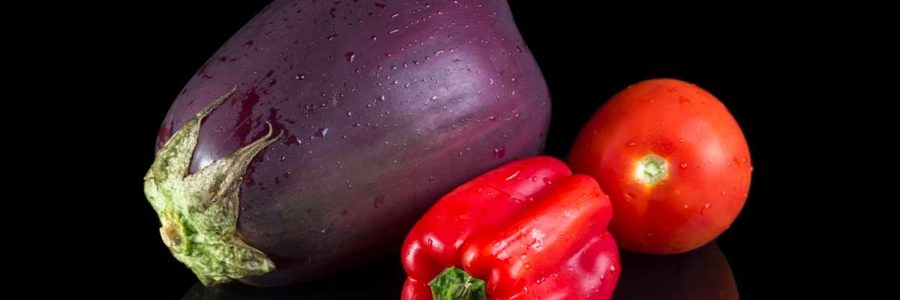What Are Nightshade Vegetables and How Bad Are They For You?
The term “nightshade” refers to a family of shrubs, herbs, trees, flowers, fruits, and vegetables that are part of the Solanaceae nightshade family. Some nightshades also tend to flourish in shady areas or bloom at night. Nightshade vegetables like tomatoes & eggplant are rich in nutrients but often get a bad reputation in some diets: many believe they are linked to various health issues such as headaches, inflammation, and osteoporosis. Read more to learn if you should avoid nightshade vegetables.
Common Nightshade Vegetables | Non-Nightshade Vegetables | Do Nightshades Cause Inflammation? | Benefits of Nightshade Vegetables | Should You Avoid Nightshade Vegetables?
Common Nightshade Vegetables
Nightshade vegetables are among the most popular veggies in the American diet. They are added to many everyday dishes and eaten as sides or appetizers. The most popular nighttime vegetables include the following:
- Tomatoes
- Bell peppers
- Eggplant
- Goji berries
- Potatoes
- Hot peppers
Nightshade vegetables are most abundant in warm, tropical climates such as Latin America.
Non-Nightshade Vegetables
Many people avoid nightshade vegetables because they believe these foods can cause health issues or worsen preexisting conditions. Unfortunately, some people will refrain from eating certain vegetables because they think they are nightshades, but they are not. For example, beets, spinach, swiss chard, and blueberries are often mistaken for nightshades but are non-nightshade vegetables. The following vegetables are suitable replacements for nightshade veggies:
- Sweet Potato
- Mushrooms
- Onions
- Broccoli
- Beets
These vegetables are nutrient-dense and have many health benefits, making them ideal replacements for nightshade vegetables.
Do Nightshades Cause Inflammation?
There is a growing concern among many that nightshade vegetables can cause inflammation. One such belief links nightshade vegetables to inflammation and intestinal permeability. Also known as leaky gut, this term describes when the cell linings in the intestinal wall become porous or loose, allowing harmful bacteria and toxins to “leak” or seep into the bloodstream. Although the medical industry does not entirely accept this condition as a legitimate illness, many claim it can make inflammation, arthritis, autoimmune disorders, allergies, and a host of other conditions worse. Diets low in fiber but high in fat and sugar are believed to be potential causes of this intestinal permeability. Even though nightshade vegetables are healthy, there is a belief that the fiber pectin in tomatoes and the capsaicin in peppers can also increase intestinal permeability. However, medical experts have not verified this, and studies are still ongoing.
Benefits of Nightshade Vegetables
Despite the controversy, nightshade vegetables have many nutrients and health benefits:
Tomatoes. Tomatoes are often added to sandwiches and salads. They are a good source of antioxidants, vitamin A, iron, potassium, vitamin C, manganese, dietary fiber, and vitamin B-6. Tomatoes have a high water content, making them suitable for skin health. They also contain lycopene, believed to help protect the body from certain cancers.
Bell peppers. Bell peppers are popular additions to stir-fry dishes and other meals. Often added for flavoring, they contain fiber, vitamin A, essential minerals, and vitamin C, which are often used to treat the common cold.
Eggplant. Popular among vegetarians, eggplant is a good source of manganese and antioxidants, which may help protect the body from oxidative stress and neutralize free radicals. It is also rich in phenolic compounds, an antioxidant believed to help with cholesterol buildup, cancer prevention, and treating viral and bacterial infections.
Potatoes. White potatoes are the most popular vegetable in the United States. The nutritional benefits of potatoes can depend on how the vegetable is prepared. The fried variety of potatoes (french fries, potato chips, etc.) loses many nutrients during the cooking process and is high in calories, fat, and salt. On the other hand, baked or boiled potatoes retain their nutritional value and are low in calories. Potatoes are an excellent source of fiber, potassium, vitamin b-6, flavonoids, and vitamin C. Eating high-fiber foods such as potatoes could help a person feel fuller for extended periods. This fullness could reduce the urge to overeat and assist with maintaining a healthy weight.
Hot peppers. Red & green peppers, serrano peppers, and jalapenos are all members of the hot pepper family. They all contain capsaicin, which gives pepper its spicy flavor and might help decrease inflammation in the body. They are also excellent sources of vitamin C, which allows the body to absorb iron and possibly offer protection from heart disease.
Goji berries. Goji berries have been used in Chinese medication to treat various ailments, including relieving headaches, poor appetite, and back pain. Goji berries are high in antioxidants and amino acids, such as tyramine, which helps regulate blood pressure.
Should You Avoid Nightshade Vegetables?
Nightshade vegetables can be added to various dishes and are some of the most popular vegetables in the U.S. Many believe the vegetables could trigger various health issues, such as inflammation, osteoporosis, leaky gut, and migraines. Research on nightshade veggies has been unable to confirm the validity of these claims, but many are still concerned and choose to avoid them. Sometimes, the problem may be a food allergy or sensitivity to a specific ingredient in the nightshade vegetable. Food allergy symptoms can include hives, itching in the throat, swelling, difficulty breathing, and skin rashes. (Consult a doctor immediately if any of these symptoms become severe). One way to determine if a person has a food allergy is to note how the body reacts to food. Another option is to remove foods and slowly reintroduce them into the diet one at a time to decide if they are the culprit. Nightshade vegetables are high in vitamins and nutrients, but for those unable to consume them, there are many great healthy alternatives to choose from.


